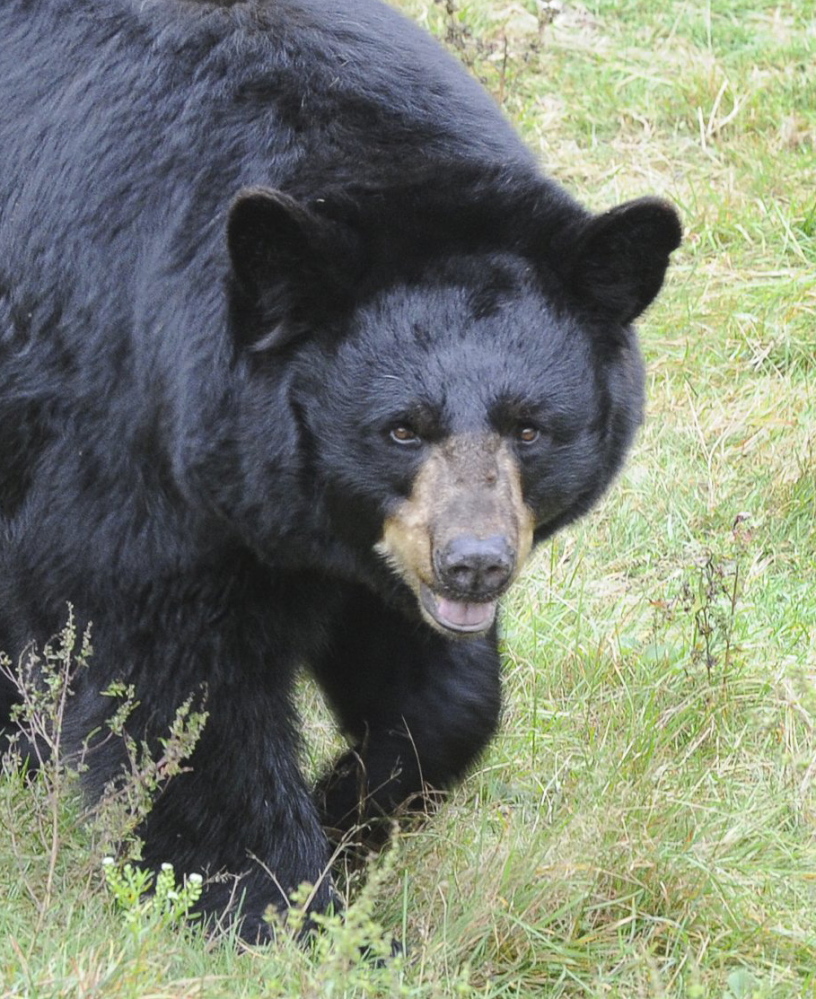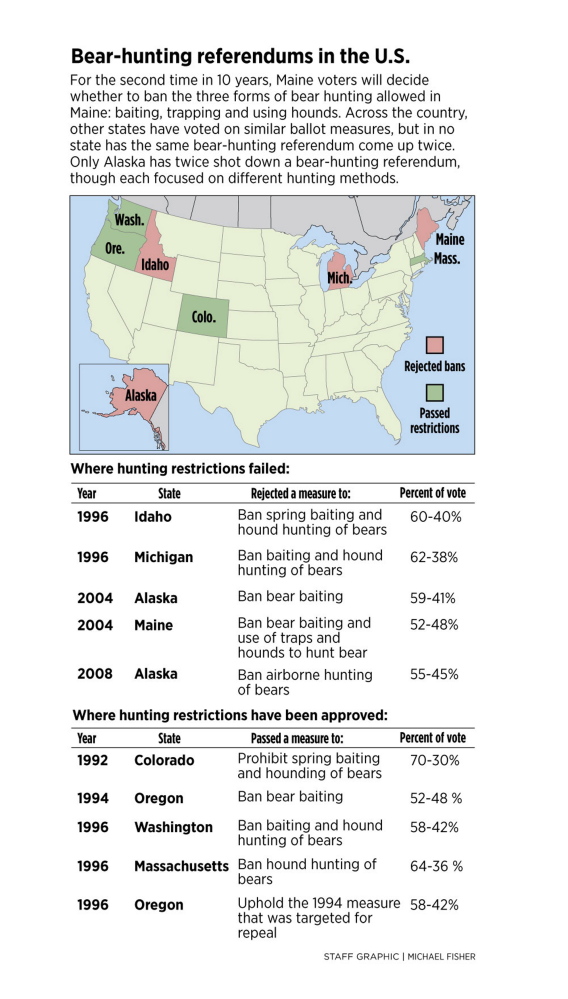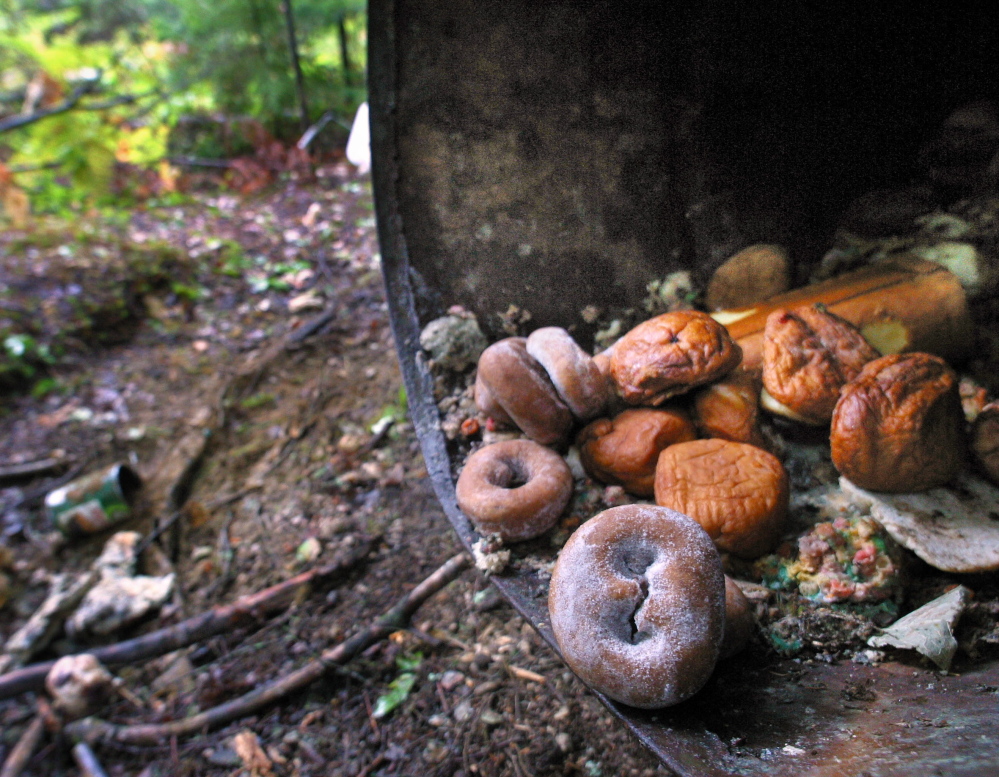For the second time in 10 years, a proposal to prohibit three bear-hunting methods in Maine will be on the November ballot. Opponents and proponents say the referendum will be watched around the country.
The citizens initiative, certified this week by the Secretary of State’s Office, would prohibit bear hunting with bait, hounds and traps. Whether it is passed or rejected, it will have far-reaching effects on wildlife management and traditional outdoor sports across the country, interested parties say.
“I think it would start a ripple effect and create momentum in other states because the Humane Society of the United States would be emboldened by winning here … where hunting and wildlife management are so ingrained in our culture,” said David Trahan, executive director of the Sportsman’s Alliance of Maine, a leading opponent of the measure.
The ballot measure would prohibit hunting with bait, in which a pile of sugary food is put out to attract bears; hunting with hounds, which are used to tree bears for hunters to shoot; and trapping, in which snares hold a bear to be shot later. Maine is the only state that allows recreational trapping.
Sportsmen and guides oppose the measure, saying that all of those hunting methods are needed to manage the black bear population. Wildlife advocates support it, saying the practices are unethical and don’t constitute fair chase or effective wildlife management.
Voters in four states have approved similar measures, while Maine and three other states have rejected such bans. A question on Maine’s ballot in 2004 was rejected.
Proponents of the ban were encouraged by states where similar ballot measures passed, said Daryl DeJoy, executive director of the Wildlife Alliance of Maine.
“We are looking at the states that accepted this ban and have seen what happens,” said DeJoy. “It’s telling to see there are more bear hunting licenses there, and hunters are taking more bears. We should be able to hold ourselves up as a good example of bear management.”
The referendum is being watched closely by wildlife advocates and animal-rights groups, said Katie Hansberry, director of the Maine chapter of the Humane Society of the United States.
“I definitely think people across the country will be watching this issue, and once Maine voters say yes, I think people in other states will be inspired to take action to stop inhumane practices such as hounding and baiting,” Hansberry said.
The humane society chapter in Maine organized more than 2,000 volunteers to gather signatures in more than 400 towns to put the question on the ballot. The Secretary of State’s Office certified 63,626 signatures, out of 78,528 submitted.
Hansberry would not comment on the national significance if Maine voters reject the proposal for the second time. “We’re really confident we will win in November,” she said.
OTHER STATES WATCHING MAINE DEBATE
Biologists in Alaska are watching, said Bruce Dale, deputy director of the Alaska Fish and Game Department’s Division of Wildlife. Voters there rejected a ban on baiting in 2004 and a ban on hunting from the air in 2008.
“We’re following it. But we have three board meetings a year, and at none of them have any proposals by the public come up,” Dale said. “And anyone in the public can propose to ban black bear hunting.”
Ryan Scott, a regional wildlife manager with the Alaska department, said such referendums are a good way for biologists to gauge how the public views wildlife management.
“As a local manager for black bear hunts, I think it is interesting to see the public perception and opinions about the various methods of taking black bear,” Scott said.
In Michigan, special attention will be paid to the arguments over whether to allow or ban the three bear-hunting methods in Maine, said Adam Bump, a bear specialist with the Michigan Department of Natural Resources.
“Any time you have this sort of challenge or discussion occurring in another state, there is a tendency for biology agencies to watch and see what happens,” Bump said. “This sort of thing is becoming more common. We’ll be watching Maine to see how it plays out. It’s helpful for us to know, in case there is more discussion here.”
WILDLIFE OFFICIAL: TRUST STATE BIOLOGISTS
Opponents of the initiative in Maine say the second attempt to end the bear-hunting methods discounts the work of state biologists, who lead what many call the most comprehensive bear study in North America.
“If it’s rejected, it would send a message that the people in this state trust our biologists, and they recognize the management system is based on sound science,” said Judy Camuso, director of the wildlife division in Maine’s Department of Inland Fisheries and Wildlife.
If the measure passes, she said, it will limit Maine’s ability to manage black bears and keep the population at a level at which the public is comfortable.
“People in other states are talking about it,” Camuso said. “Biologists are paying attention, absolutely. They’re following what happens here.”
She said a public working group decides how visible Maine’s bear population should be, and that population is kept in check to a large extent by hunters who put out bait, a method that Maine hunters have used for the last century.
Camuso said it’s uncommon and difficult to hunt bears in Maine without baiting, hounding or trapping.
Don Kleiner, executive director of the Maine Professional Guides Association, said the initiative has been launched again by the humane society because Maine is something of a mecca for the bear hunting culture in America.
“Bear hunting is a big part of our rural economy, and it’s an important part of our heritage,” said Kleiner. “If you can knock it off here, you probably can anywhere.”
Correction: This story was updated at 10:43 a.m. on Wednesday, March 26 to clarify that snares are used in trapping bears. Leg-hold traps are illegal in Maine.
Deirdre Fleming can be contacted at 791-6452 or at:
dfleming@pressherald.com
Twitter: FlemingPph
Send questions/comments to the editors.






Success. Please wait for the page to reload. If the page does not reload within 5 seconds, please refresh the page.
Enter your email and password to access comments.
Hi, to comment on stories you must . This profile is in addition to your subscription and website login.
Already have a commenting profile? .
Invalid username/password.
Please check your email to confirm and complete your registration.
Only subscribers are eligible to post comments. Please subscribe or login first for digital access. Here’s why.
Use the form below to reset your password. When you've submitted your account email, we will send an email with a reset code.